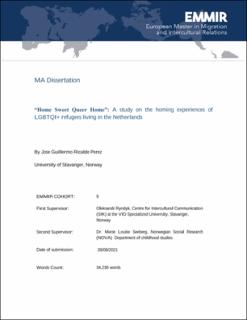| dc.contributor.advisor | Ryndyk, Oleksandr | |
| dc.contributor.advisor | Seeberg, Marie Louise | |
| dc.contributor.author | Ricalde Perez, Jose Guillermo | |
| dc.coverage.spatial | the Netherlands | en_US |
| dc.date.accessioned | 2021-11-01T13:08:33Z | |
| dc.date.available | 2021-11-01T13:08:33Z | |
| dc.date.issued | 2021-08 | |
| dc.identifier.uri | https://hdl.handle.net/11250/2826906 | |
| dc.description | Master's thesis in Migration and Intercultural Relations | en_US |
| dc.description.abstract | The Netherlands was one of the first European countries to provide refugee status due to persecution on the grounds of sexual orientation and gender identity. Since then, the country has been perceived as a promising land of acceptance for LGBTQI+ migrants and refugees. However, queer refugees are often asked to prove their identities by the Dutch authorities in a procedure where past life events are questioned, and specific narratives are forced to gain credibility in their asylum claims. During this process, LGBTQI+ individuals' homing experiences are juxtaposed by describing a previous heteronormative 'home' where their gender and sexual identities were marginalized while conceiving the Netherlands as a welcoming and tolerant 'home' towards them. This dichotomy of queer refugee’s homes seems insufficient to comprehend the multi-layered and unfixed nature of the home's concept and its connection with gender and sexual diversity. Therefore, this thesis aims to contribute to the debate on the queer-home-migration nexus by unraveling the multiple interactions between sexual diversity and migration in queer refugees' notions of home.
Through a qualitative approach based on semi-structured interviews and using the analytical framework of queer theory, intersectionality theory, and Paolo Boccagni's homing, I explore the home experiences of queer refugees living in the Netherlands. The results show that for the interviewees, attributes such as safety and acceptance have gained relevance as primary factors in their homing.
Moreover, for some of them, home is not permanently emplaced in a specific country. Instead, it relates with attachments to certain environments, feelings, relationships, and communities. The findings also demonstrate that for some queer refugees, the intersection between race and gender identity significantly limits their homing in the Netherlands as desired. Finally, queer refugees are continuously building their homes through attitudes of resilience and resistance against heteronormative patterns. | en_US |
| dc.language.iso | eng | en_US |
| dc.publisher | University of Stavanger, Norway | en_US |
| dc.relation.ispartofseries | Studentoppgave/UIS-HF-IGIS/2021; | |
| dc.rights | Navngivelse 4.0 Internasjonal | * |
| dc.rights.uri | http://creativecommons.org/licenses/by/4.0/deed.no | * |
| dc.subject | flyktninger | en_US |
| dc.subject | homoseksualitet | en_US |
| dc.subject | queer | en_US |
| dc.subject | LGBTQI+ | en_US |
| dc.subject | Nederland | en_US |
| dc.subject | seksuell orientering | en_US |
| dc.subject | interkulturelle relasjoner | en_US |
| dc.title | “Home Sweet Queer Home”: A study on the homing experiences of LGBTQI+ refugees living in the Netherlands | en_US |
| dc.type | Master thesis | en_US |
| dc.subject.nsi | VDP::Samfunnsvitenskap: 200::Samfunnsgeografi: 290 | en_US |

